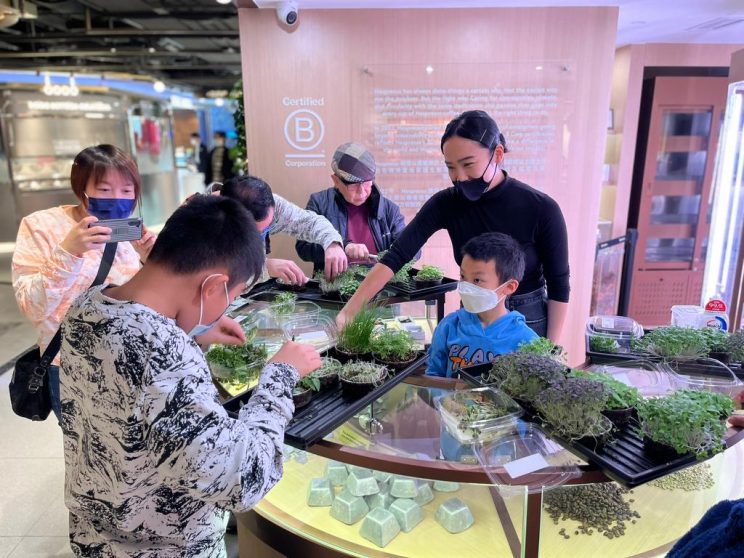Common Farms
The macro impact brought about by microgreens

Jessica Fong never intended to become an urban agriculture specialist, nor did she intend to open a 9,000 square foot indoor farm in Yau Tong, but over the span of five years, that’s exactly what she did.
Founded in 2017 on a tiny patch of land on Cheung Chau, Common Farms was created to make healthy, fresh food more accessible in Hong Kong. From its humble beginnings through to today, the business has grown to become one of the city’s leading local sources of speciality produce, including microgreens, edible flowers, seeds, grow kits, and more.
See a need, fill a need
The idea for Common Farms is a simple one – to bring flavourful, locally grown produce to Hong Kong. There are plenty of restaurants and chefs in Hong Kong who want to source the freshest ingredients they can, but, with the city’s traditional agriculture sector often referred to as a ‘sunset industry’, they don’t have easy access to farms. Jessica herself spent several years working in hospitality where she saw this problem first hand.
In 2016, her frustrations reached a head. “I saw a problem, and I wanted a solution,” she says. “Sugar, sauces, over-processing, etc, it’s not what we need for Hong Kong, or any society, to thrive.” Jessica wanted freshness and flavour, and most importantly, she didn’t want to have to import it. After all, how ‘fresh’ is fresh produce if it has to travel for a long time to get here, or be grown using pesticides and chemicals that inadvertently kill nutrients and diminish the flavour? “I didn’t think I was going to build a farm, but I was feeling frustrated with this problem. I knew the risks [associated with starting a business], but eventually I realised I would need to produce food myself, locally.”
Hong Kong’s soil is the perfect starting point for growth
Having worked in the catering industry, Jessica was somewhat familiar with her target market. She believed the high consumption power in Hong Kong made it a worthwhile location to trial the Common Farms concept. Since she had no experience in agriculture, her earliest days were spent watching YouTube videos on plant growth and networking with established industry experts to learn about what it takes to run a successful farm of her own.
“The benefit of Hong Kong lies in its close proximity and concentration [of potential clients],” she says. For example, a number of Common Farms’ customers reside in the same building in Central, making delivery logistics a breeze. “I can visit up to 10 customers in just half a day. Where else can you do that?” Today, Common Farms’ customers include the likes of Fortnum & Mason, 8½ Otto e Mezzo Bombana, Amber, Arbor, Caprice and more.
Hong Kong’s dynamic market made it the perfect starting point for Common Farms. “If we can make it work in Hong Kong, in a way, it makes it easier elsewhere because we have already overcome challenges and solved a lot of problems that may come up again.”
Making sustainability simple in a convenience-driven market
Another outcome of the city’s convenient concentration is the opportunity for partnerships and collaborations. In 2019, Common Farms moved into a 1,600 square foot space in Aberdeen. There, the regional marketing head of a major coffee capsule brand paid them a visit. They were investigating ways to make their brand’s sustainability efforts more locally relevant and wondered whether the Common Farms team might be open to a partnership of some kind. A year later, RE:FARM was born, a nine-month showcase in K11 Musea through which members of the public could learn about microgreens and urban agriculture during a 40-minute workshop.
The workshop took consumers through the entire coffee capsule separation process and showed them how coffee grounds can be used in compost. On-site, they used bokashi enzymes to break down food waste and reduce the smell of composting – a method that can be easily used in private residences. Participants were also guided on how to most efficiently harvest microgreens and store them for the longest possible time at home. Nothing was without purpose: even the damp paper used to keep workshop-harvested produce fresh inside a takeaway box was made of recycled bamboo.
A small idea with large impact
Although Common Farms was not founded with a carbon reduction mission in mind, it was uniquely positioned to not only help people gain access to healthier food choices, but to also educate them on how we could reduce Hong Kong’s carbon footprint.
Through the pop-up showcase and workshop, Jessica and her team made sustainable education accessible and convenient; more people were able to understand the ‘why’ behind recycling and composting initiatives. “We even saw some workshop participants coming back to us and saying, ‘Every time I go to my favourite restaurant nowadays, I can’t stop thinking about the little greens.’ They become more conscious about it. And that’s a great encouragement for us.”
It was not Jessica’s intention to found a carbon-neutral business, but the Common Farms business model and values very organically aligned with Hong Kong’s carbon-neutral goals. As Common Farms grew and expanded over the years, the team has also developed new operational knowledge and enacted the ‘greenest’ method of growth. “It’s the labour hours, the soil we use, the seeds we source, the lights, et cetera. It’s all about energy.” So much so, in fact, that when setting up their newest farm in Yau Tong, Common Farms made sure to liaise with the local electricity provider to determine the most eco-friendly (and efficient) method of air conditioning. From the soil they use through to the light bulbs – every input was considered for wider environmental impact.
Advice for young entrepreneurs and startups:
“Figure out the raw intention [of your business] and be honest with yourself. Once you start, you have to keep going no matter what. The rate of failure is predicated on the amount of giving up, and a lot of giving up happens because you didn’t get your value or intention right. It should start with some level of passion – you’ll figure it out one way or another.”
– Jessica Fong, Founder and CEO of Common Farms


